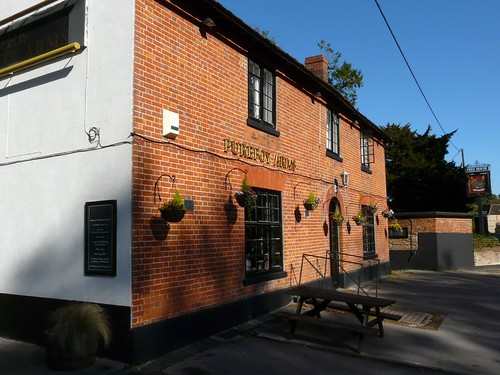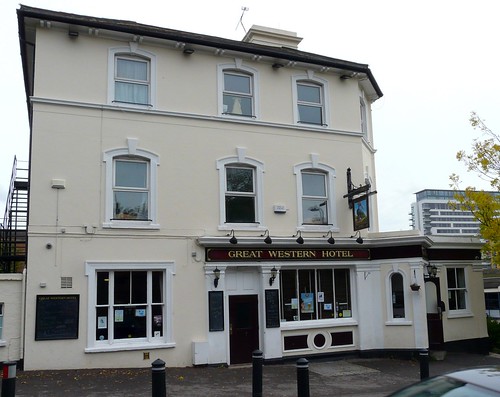A 600-year-old timber framed Inn, Free House, with wooden beamed ceilings, stone-wood flooring, high backed oak chairs and handcrafted tables.
The present owner has been established at The Three Cups since 1978 and has enjoyed seeing customers coming back year after year
Saturday, 28 November 2009
The Three Cups, Stockbridge, Hampshire
Friday, 27 November 2009
Wednesday, 25 November 2009
Monday, 23 November 2009
The Flying Bull. Rake, Hampshire
This was once a very important coaching stop on the London - Portsmouth road. The Hampshire/W. Sussex boundary runs through the middle of the pub. The parish of Liss has a tradition of "beating the bounds" and they used to put a boy into the oven at the Flying bull to beat the bounds as the parish boundary is reputed to run through the kitchen.
Thursday, 19 November 2009
The Weyhill Fair, Weyhill, Hampshire
Weyhill Fair was the longest lived of any of the rural fairs and was actually three separate fairs held on 11th April, the last Friday in July and from October 9th to the 12th. It was held to the west of Andover on the Fair
Ground, a parcel of land at the junction of two ancient ways - the 'Gold road' from Holyhead which was reputedly used to carry Irish gold to south coast ports - and the Harrow Way, one of our oldest trade routes running from the West Country through the heart of Southern England to Dover. Weyhill was also at the junction of six other 'drift roads' to major settlements in the region.
Weyhill was the fair which provided the factual information upon which Thomas Hardy based his fictionalised account of wife-selling in The Mayor of Casterbridge. Thieves and vagabonds were drawn to the fair and often the only way to keep hold of your money was to sew it into the lining of your clothes. In its heyday it was a gigantic amalgam of stock market, superstore and theme park. There could be up to 100,000 sheep sold in a day; there were horse dealers and cattle sales, there were booths selling ales, cheese, jewellery, clothing and a great variety of household goods. There was a wide range of amusements including side shows, freak shows, boxing and wrestling booths and humble swings and roundabouts. Substantial stalls were built to house some of the established traders and these were eventually made permanent - some of these can still be seen on the site today.
Wednesday, 18 November 2009
The White Horse, Ampfield, Hampshire
The White Horse is situated on a slight bend in the main road that runs between Romsey and Winchester. It benefits from having a large garden that overlooks the downs and meadows of Hampshire and is next to both the village cricket ground, the recreation area and an 18 hole par 3 golf course.
Ampfield is set in beautiful countryside about two miles to the East of the picturesque country town of Romsey, and about seven miles south of historic Winchester, the ancient capital of Wessex. The River Test and its lovely valley are two miles to the north-west, and the New Forest is about eight miles to the south-west.
The village can trace its roots back to prehistory, and our History page outlines the development of the village over the years. The countryside around Ampfield has changed little over the centuries. The countryside surrounding Ampfield and its adjacent parishes has been designated a Heritage Area, and the Heritage Area Group promotes schemes to protect and enhance it. The many public footpaths provide a pleasant way of exploring the parish
Ampfield is also the home of the world famous Hillier Gardens (formerly known as the Hillier Arboretum) These gardens hold the greatest collection of hardy trees and shrubs in the world. Started by the late Sir Harold Hillier in 1953 and given in trust to Hampshire County Council in 1977, the Gardens now extend to 180 acres. Within this unique collection of more than 42,000 plants (12,500 different types), visitors will find much of interest throughout the year.
Tuesday, 17 November 2009
Purefoy Arms, Preston Candover, Hampshire
The Purefoy Arms is situated in the heart of the candover valley just 7 miles from Basingstoke on the B3046
Here is the pub in the 1960's
www.francisfrith.com/preston-candover/photos/the-purefoy-...
Sunday, 15 November 2009
The Royal Oak, Lasham, Hampshire
Cosy log fires for the winter months and spacious, beautifully
maintained gardens, with BBQ area - for when the sun shines!
Large covered heated patio area with benches, bar tables and
stools - ideal for those who still want to smoke whilst at the pub!
Saturday, 14 November 2009
The Gentleman Jim, Alton, Hampshire
JIMMY Dickinson holds a unique place in Pompey history. Many famous names in soccer have served their clubs with distinction and dedication but surely the most distinguished and loyal of all was 'Gentleman Jim.' He was one of the great names in football during the game's golden age after World War Two when crowds flocked back to soccer in their millions.
Born in Alton in 1925, Dickinson joined Pompey from Alton Youth Club having been discovered by his maths and sports teacher Eddie Lever, who later managed his old pupil at Fratton Park. After three years' national service in the Royal Navy, Dickinson
made his league debut against Blackburn Rovers at Fratton Park in 1946.
Having settled quickly into the side, he established the number six shirt as his own and helped steer Pompey to successive league championships with his other resplendent colleagues. His sound, consistent and unobtrusive performances earned him England recognition too - a total of 48 appearances for his country made him Pompey's most capped player of all time. More significantly he played 764 league games for Pompey - a record for one player at a single club which was not broken until Swindon's John Trollope went six better in 1980.
In addition to his remarkable playing career, Dickinson was a gentleman both on and off the pitch. He was never booked or sent off in 800 Pompey and England matches. His industrious and sure footed style at either wing-half or left-half is still happily remembered today by those who watched him in probably the best half-back line this country ever had alongside Jack Froggatt and Jimmy Scoular.
Dickson was a Pompey stalwart for almost 20 years. Awarded the MBE in 1964, he played his last match for the Blues a year later, helping Pompey to a 1-1 end-of-season draw at Northampton that secured safety from relegation. And when he retired from playing, his loyalty did not cease. He served Pompey as public relations officer and then secretary before reluctantly accepting the job he never wanted - that of Pompey manager - in May 1977. Relegation from the third division was avoided, but the next year Pompey dropped into soccer's basement.
The worry of managing the famous old club in the fourth division affected his health and sadly, after three heart attacks Jimmy died aged 57 in 1982. The famous Pompey Chimes rang hauntingly around St Mary's Church in Fratton at a packed memorial service for the much-loved legend. Portsmouth is a city of many famous names and one with which it is synonymous is that of Jimmy Dickinson. Gentleman Jim will be remembered in Pompey forever
Tuesday, 10 November 2009
Monday, 9 November 2009
The Chineham Arms, Chineham, Basingstoke, Hampshire
The Chineham Arms is a traditional pub with an open plan bar.
Sunday, 8 November 2009
The Great Western Hotel, Basingstoke, Hampshire
Close to the railway station.
Currently under the ownership of Debbie and Mark Copley, the Great Western Hotel Basingstoke is an alternative bar. As such anyone and everyone (as long as you are not barred) are welcome and they are most definitely sub culture and biker friendly. They host live acts of all different genres of music including jazz, rock, metal, punk, goth, blues, psychobilly etc.
Saturday, 7 November 2009
The White Hart, Basingstoke, Hampshire
The White Hart Inn is approx 300 years old and is one of the oldest Pub’s in Basingstoke. Recently refurbished, we have some cosy corners and sofas where you can relax and enjoy drinks, meals and conversation.
Friday, 6 November 2009
The Cricketers Inn, Longparish, Hampshire
Longparish is a most apt name for the village as it is, indeed, a long parish, winding and twisting for three miles along the Test. The name did not appear until the middle of the 16th century, at about the time of the Dissolution of the Monasteries, before which it was known as Middleton (of Middletune).
The parish was formed from four ancient ‘tithings’, East and West Aston, Middleton and Forton. Apart from some postwar development of council housing, Longparish remains much as it has for centuries, with half-timbered, brick and flint cottages.
The stocks near the village church are, alas, not the original ones, but the old grindstone is. The "Ashburn Rest" seat, provided by a thoughtful Rev Burnaby-Green in 1886, was sited by the spring with a tin cup. It was a long walk to church for some.
Longparish has held the Samuel Whitebread Trophy for village cricket, contested at Lords' cricket ground, London
Thursday, 5 November 2009
The Plough Inn, Longparish, Hampshire
The Plough inn dates back to 1721 according to parish records and can be found in the picturesque Test Valley village of Longparish. The inn is within casting distance of the river Test famous for its excellent fishing rights. The inn is also on the Test way making it an ideal watering hole for thirsty ramblers. A familiar sight at the inn is the webbed residents of Longparish who waddle over for a bite to eat from anyone who can bear to share their baguette! The Plough was sympathetically refurbished in late 2006 and has a warm, comfortable atmosphere with flagstone and oak floors complimented by leather chairs and subtle soft furnishings open log fires and superb food, wines and real ales.
Wednesday, 4 November 2009
Tuesday, 3 November 2009
Monday, 2 November 2009
The Kings Arms, Lymington, Hampshire
The Kings Arms is a red brick built traditional coaching inn dating back from 1597, located in the centre of the historic town of Lymington and is reputed to have been patronised by Kings Charles I.






















